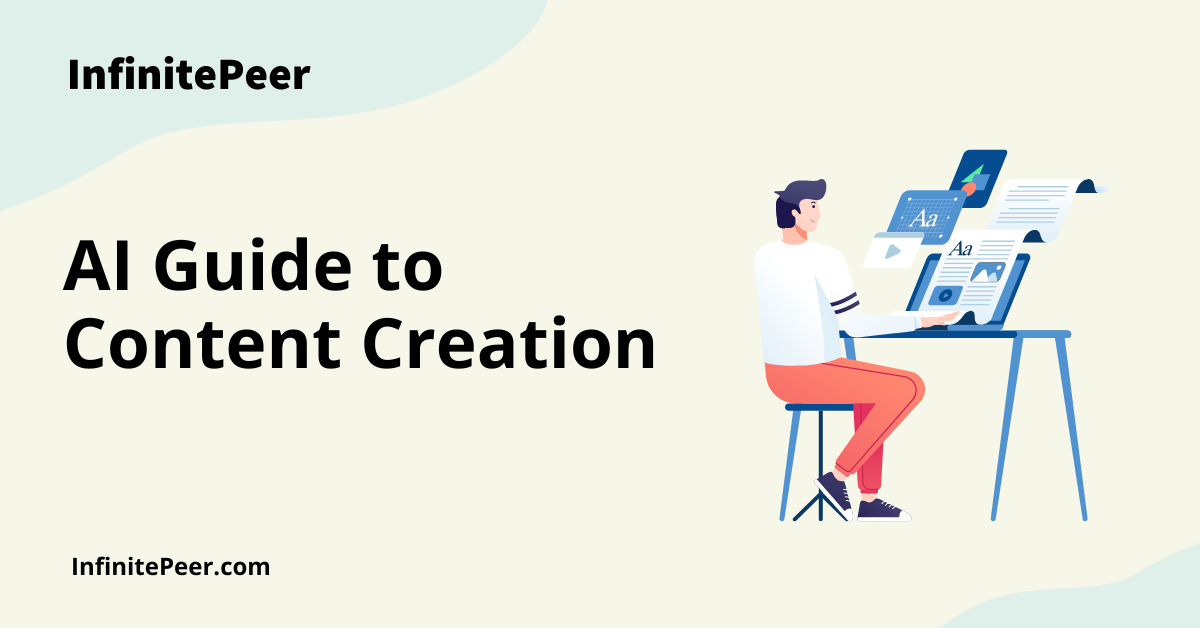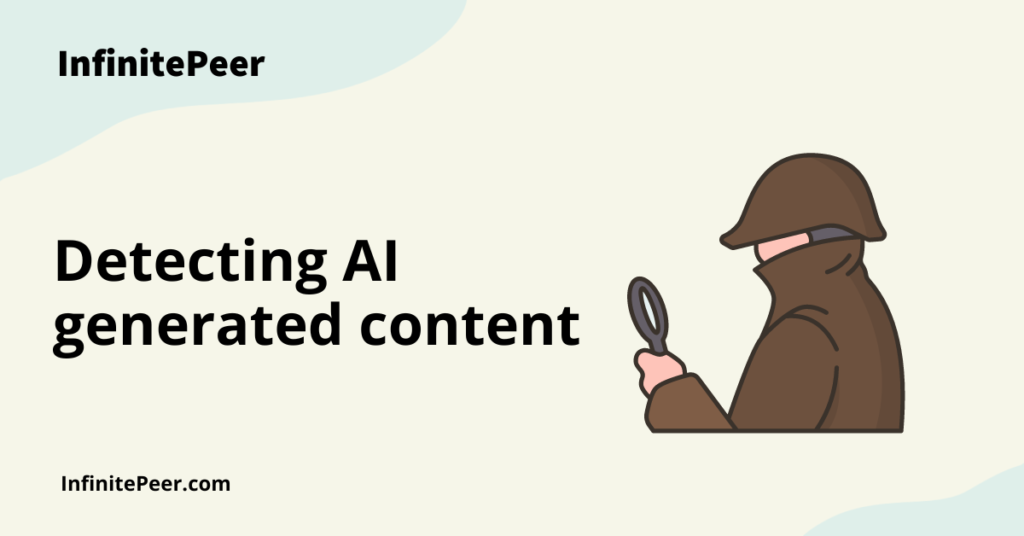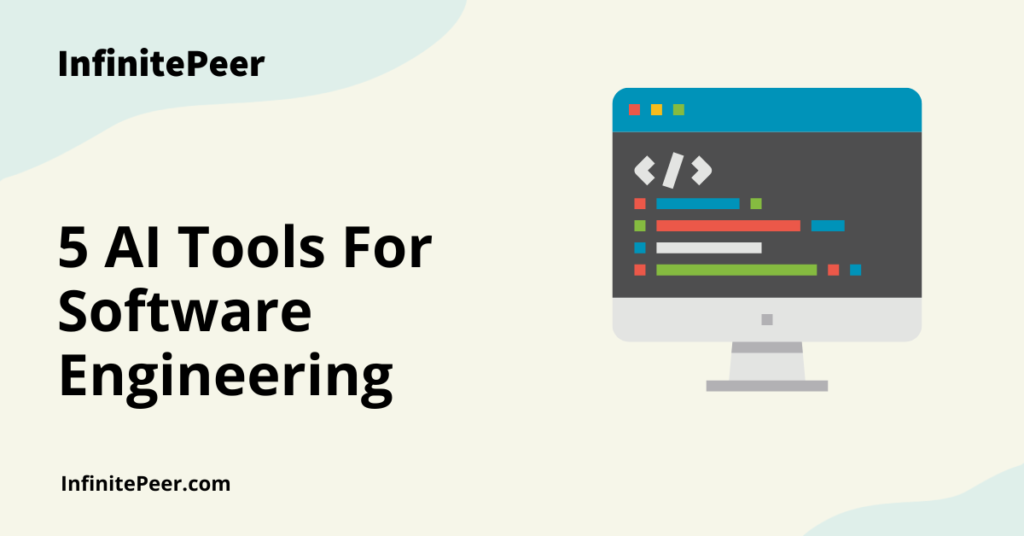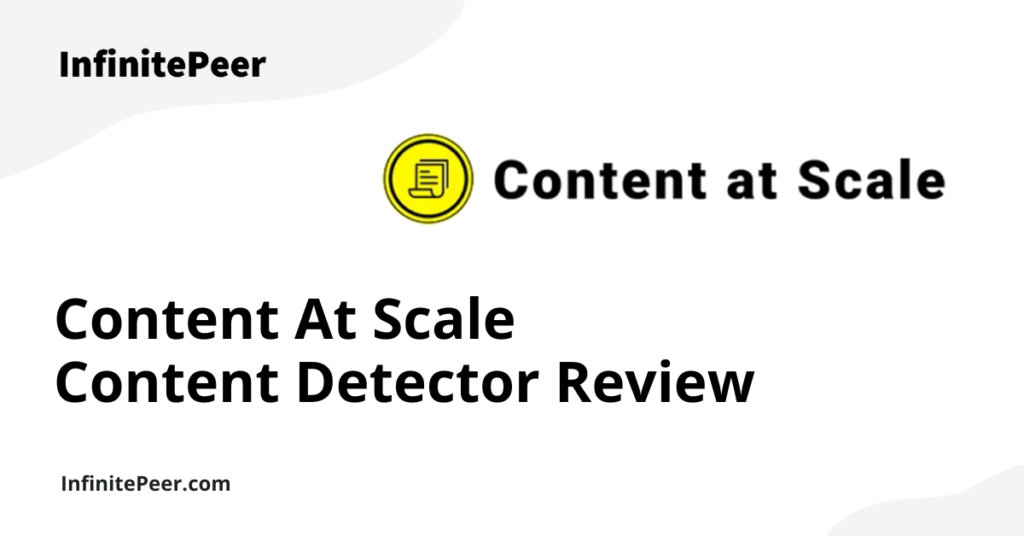It’s no secret that AI has become an integral part of our reality. It’s constantly transforming the way we live, work, and consume. Even the most human-centered professions are merging with AI. Marketing and content creation are no exceptions – the market for AI in marketing reached $20 billion in 2022 and is projected to keep growing.
In this comprehensive guide, we will tell you everything you need to know about AI in content creation and the best ways to implement content generation software to help grow your business.
Content Creation: What, How, and Why
What is Content Creation?
Content creation is the process of creating the written, visual and audio content that we consume everyday. Content creation in marketing includes three major processes:
- Identifying the scope of topics and ideas that appeal to a target audience;
- Generating textual and visual content on these topics;
- Delivering the content to the target audience via the appropriate marketing channels.
What are the Main Responsibilities of a Content Creator?
Having a way with words is not enough to do a quality job as a content creator. Professionals in this sphere cover a large number of tasks:
- Research and analyze niche-related digital content;
- Prepare content plans and briefs to suit marketing purposes;
- Conduct SEO research;
- Create, proofread, edit, and publish content;
- Collaborate with marketers and designers to ensure content quality and relevance.
Why is Content Creation Important?
Content creation is at the core of effective B2C and B2B marketing. It provides essential value for your business across multiple areas:
- Quality marketing content attracts and engages both potential and existing customers;
- It fosters lead generation and boosts conversions. 41% of marketers report that quality content has helped them improve the quality and number of leads they generate;
- It helps you increase organic web traffic and improve SEO;
- It boosts brand awareness and brand trust;
- It promotes community building around your brand and increases brand loyalty;
- It is cost-effective. A recent study from DemandJump shows that content marketing requires 62% less spending than traditional marketing.
Types of Content Creation
As digital marketing evolves, new types of content spring up every day. Let’s take a look at the main types of content used for effective marketing today:
- Blogs, articles, and guides. These are larger pieces of content that usually provide educational value to your prospects and customers;
- Images and graphics. Visual aids enrich marketing materials and help keep the audience hooked on the content;
- Videos. Video content is an important brand awareness tool for 92% of marketers;
- Social media content. This low-cost content type is effective if you want to attract younger generations of consumers who spend a lot of time on social media platforms;
- Other: podcasts, user-generated content (UGC), ebooks, case studies, etc.
Most marketers use a combination of various content types in their brand promotion strategy.
How does AI in Content Creation Work?
In a nutshell, AI content creation is a process of generating content with the help of the latest technology: artificial intelligence.
Of course, AI doesn’t just come up with the right kind of content for your marketing purposes of its own accord. It leverages two sophisticated models to generate the content you need: NLP and NLG.
What are NLP and NLG?
The powerhouse of AI-based content creation software is a technology called Natural Language Processing (NLP). NLP allows a machine to recognize, process, and interpret human language and textual/voice data.
The AI then uses and learns from this information and proceeds to Natural Language Generation (NLG). In other words, the software can produce spoken or written languages in response to a request or input.
- Think about Apple’s famous Siri voice assistant. Advanced AI algorithms help Siri recognize and understand your voice commands to respond to you with relevant actions or verbal responses. The more you interact with Siri, the more it learns and improves the interaction. This is just one of many examples of AI in content creation.
How is AI Being Used in Content Creation?
You can leverage AI in content creation in various ways:
Use AI to create copy
NLP-based software can generate text based on the input you feed it.
Say you need marketing content for your brand and your company’s website, to drive more traffic and build trust with your potential customers.
- You can provide an AI content creation tool with the previous texts created for your business by human writers, set a desired tone and style, and other relevant variables;
- Based on this information, the tool will generate content you can then polish and use for your marketing purposes.
Use Case: Copysmith
Copysmith is an advanced AI tool that uses diverse templates to generate ads, product descriptions, author bios, blog posts, and other marketing texts.
As you enter content ideas, keywords, desired content type, and other info, Copysmith will use its algorithms to produce a piece of content you need within seconds.
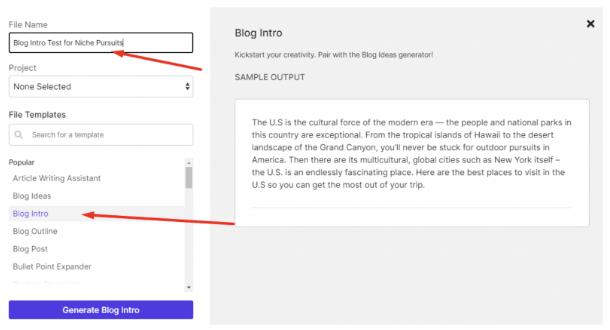
Users underline that tools like Copysmith are especially great for generating shorter texts such as ad copy, blog introductions, or social media posts.
Runner Agency has reported that using Copysmith has helped the brand’s content team reduce the time spent on writing blog articles and web pages by 80%.
Once your copy is drafted, it’s important for a seasoned copywriter or editor to review and edit the content, ensuring the brand voice is well portrayed and that all information is accurate. Although AI has improved hugely in recent years, it is still not 100% reliable.
Leverage AI to generate topic ideas and content titles
Sometimes, content creation is not so much about HOW to write but rather WHAT to write about. If your marketing team is facing writer’s block, AI is here to save the day:
- Content creation software can generate multiple topic ideas with a few clicks;
- It can also create ranking content titles for your articles.
Use Case: Semrush
Semrush is an online tool that can turn a keyword or phrase into a compelling topic or headline. The software analyzes trending content based on your request and offers unique, relevant ideas for your content creation efforts. Semrush also helps you categorize topic and title ideas to create a comprehensive content plan your marketing team can use down the road.
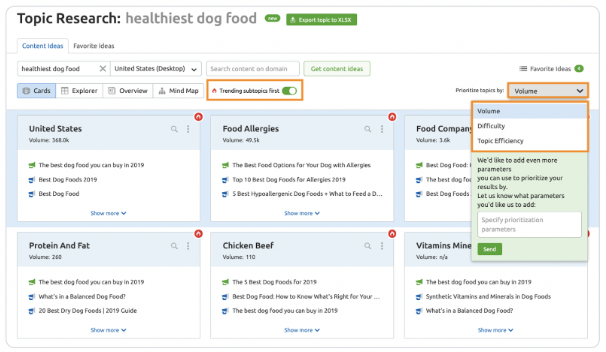
Penta, a fintech company from Germany, leveraged Semrush to generate excellent blog post ideas and optimize website content. As a result, the brand has doubled its organic traffic and number of leads within 15 months.
AI tools like Semrush are quickly becoming the most effective way to “unblock writer’s block” by generating thousands of content ideas.
Use AI content creation tools to boost SEO
Even if you write great content for your target audience, it can get lost among thousands of search results that rank higher on search engines. Content creation AI can become a real game changer when it comes to improving your SEO practices:
- It can conduct deep keyword research;
- It helps you build smart backlinks;
- It organically integrates keywords into your content to improve its search engine rankings.
Use Case: Jasper
Jasper is another AI content generation tool you can leverage. Among other things, it provides an integration with SurferSEO – an SEO marketing tool – to optimize your content for better reach.
- Jasper finds and employs link opportunities within marketing content to boost its visibility;
- It also helps SEO professionals explore less competitive keywords that enrich a marketing text and make it more discoverable on search engines;
- It can automatically improve the heading structure, metadata, and other aspects of SEO marketing.
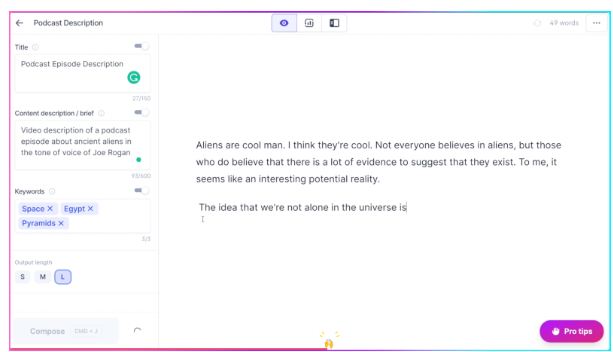
An e-commerce marketing company Digital Darts has reported that Jasper helped it grow organic keyword rankings from 0 to 7,500 and generate massive organic traffic within a year.
Generate quality video content with AI
AI in content creation goes well beyond text generation. You can also leverage it to create videos for various purposes, including e-learning, company presentations, reports, and product intros.
Video-generation AI is a perfect choice if you don’t want to invest in expensive video equipment or save time on production. The software will automate key video creation steps and give you an almost instant result.
Use Case: Synthesia
Synthesia is a content creation AI tool focusing specifically on quality video production.
- It provides editable templates for different content purposes;
- It supports a text-to-video function and generates subtitles;
- You can also create AI voiceovers for your videos in more than 60 languages.
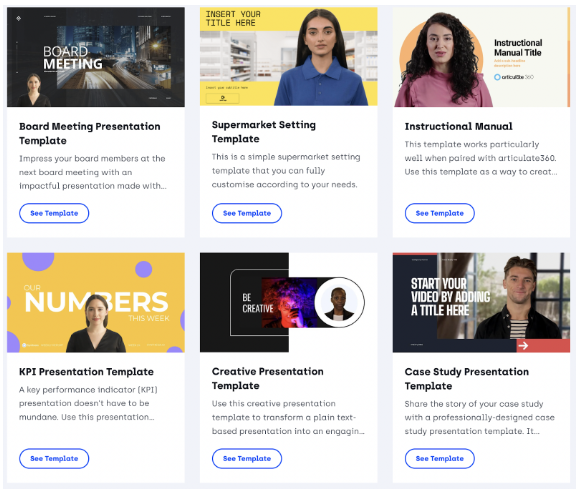
News agency Reuters has adopted Synthesia to automate the creation of presenter-led sports news bulletins.
Use AI to automate audio content generation
Do you record podcasts or create audio commentaries for your content? AI can help you enhance these practices as well!
- Audio editing software can generate and adjust the audio tracks based on the textual data you provide;
- It improves audio quality and edits the recording to refine the final product;
- It creates accurate transcripts for your audio content without human input.
Use Case: Descript
Descript is a video-audio editor that powers up content creation with the help of advanced AI features. This digital media platform is a game changer for podcast creators and audio engineers.
Apart from the general features outlined above, Descript can:
- Create an AI clone of your voice to fix pronunciation mistakes and slips (you just need to edit the text script and the AI will fix the audio);
- Remove pauses and fillers to make your audio sound clearer;
- Improve the overall sound quality of your audio content.
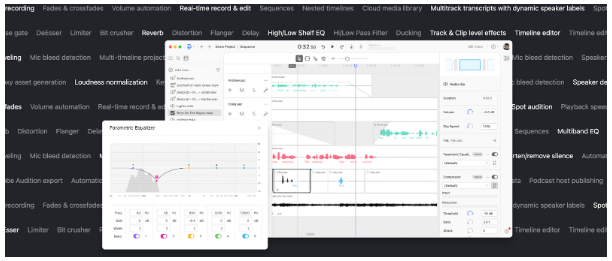
Descript is successfully used by such global brands as Shopify, Vice, and Hubspot.
Benefits of AI in Content Creation
No matter what type of content creation AI you opt for, you stand to gain some great benefits:
- It saves time and money. Automation eliminates the need to invest in otherwise time-consuming and costly processes. With quality content-generation software, you will get more things done with fewer resources;
- It scales your marketing effort. No matter the scope of the content needs your business has, AI can instantly generate as much output as necessary, allowing you to scale your content volume without adding more headcount to your team;
- It improves personalization. AI efficiently gathers valuable customer data to create content relevant and appealing to specific customer profiles and buyer personas;
- It is effective at repurposing existing content. Reusing old content for marketing purposes is sometimes unavoidable. Content-creation AI helps you refresh old content and enrich it to make it relevant for new purposes or alternative media platforms;
- AI provides better output as you keep using the software. The beauty of machine learning lies in its constant self-improvement. The more you work with a given AI tool, the better content it generates for your specific needs.
Is There a Risk in Using AI in Content Creation?
Does it look like AI content creation can address virtually any pain point your marketing team may be experiencing? Content generation software is great but we suggest you use it wisely. Otherwise, you risk getting penalized by Google.
What is Google’s automatic-generated content penalty?
Google strives to deliver accurate and trustworthy search results to its users. But some sites may use AI to manipulate SEO practices to rank higher, despite the content being lower quality or less valuable to readers.
- For example, a web source can produce low-quality content that has all the right keywords and appears at the top of your search results. Keyword stuffing may make the content unreadable and useless for a given target audience.It can also push reputable websites with quality content down the SERP;
- Other websites may take advantage of AI to blatantly repurpose old content. Such tools employ automatic rewriting to generate essentially the same text with slight structural/word choice changes. This content carries little to no value to users.
To avoid the spread of spammy content flooding search results, Google has recently announced that its webspam team will be tracing automatic-generated content and penalizing sources that produce AI-manipulated content. This action is part of Google’s effort to improve user experience and maintain content quality among high-ranking search results.
How can you avoid the penalty?
Google’s stance against AI-generated content doesn’t mean you have to stop using AI content-creation tools.
Instead, keep the balance between optimizing your content for higher SERP rankings and improving content value and quality.
Here are a few tips to make sure you steer clear of the Google penalty for automatic-generated content:
- Avoid keyword stuffing. When you use AI for content creation, don’t overload the software with keyword requests;
- Don’t use AI to duplicate previously written content. Strive to provide unique ideas to your audiences and use repurposing in moderation;
- Always have human writers proofread and edit AI-created content. Manual editing is a way to enhance the quality of AI-generated text and make sure it brings value to readers;
- Always fact-check AI-generated content, ensuring what you publish is 100% accurate
- Check Google policy updates regularly to make sure you follow webmaster guidelines.
What is the Future of AI in Content Creation?
No doubt, AI content creation will continue to develop and get more sophisticated thanks to advanced machine learning algorithms. But what exactly can we expect from automatic content generation in the upcoming years?
AI won’t replace human content creators
While AI is getting better at producing content of solid quality, it cannot detect all the subtleties of human interactions necessary to craft the right message and substitute human creativity. Even the most advanced AI content creation tools generate better results in combination with manual editing by professional writers.
AI will allow for a more effective content creation workflow
AI is sure to keep transforming the way content creators approach their jobs. A more intuitive and seamless collaboration between human creators and AI tools will result in:
- Faster work;
- Richer feature sets creators can leverage;
- Higher levels of small task automation;
- New content generation strategies.
Better content analysis and profiling
In the age of personalization, a profound content audit is crucial to creating more engaging content for diverse audiences. That’s why developers will keep improving algorithms for multifaceted content assessment.
In a few clicks, you’ll be able to analyze how your text, audio, or video sounds to your target audience, what emotions they elicit, and how effective it is for your business purposes. This will create even better opportunities for content refinement and your overall marketing efforts.
Conclusion
More than 72% of professionals claim to be using or planning to use AI for content creation in 2022. And it’s not surprising – content-generation software is a superb tool for creators, marketers, influencers, business owners, and many other specialists from all niches.
Modern technology is facilitating better collaboration between AI and human content experts to pave the way for even more engaging, relevant, and effective content.
The best thing is – you can start leveraging AI to boost your content creation efforts right now. Explore the vast pool of tools available on the market and opt for those that will fit your goals.
